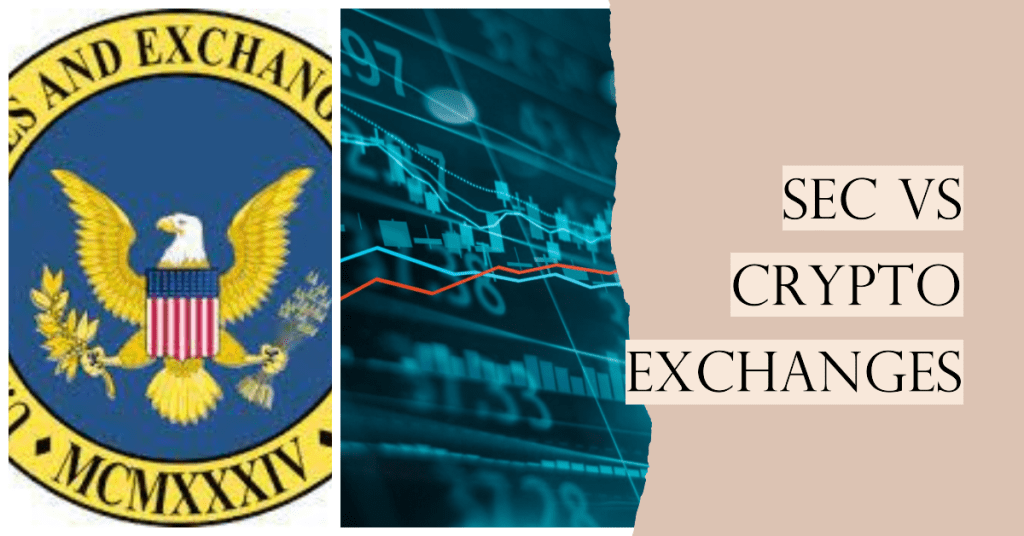As we enter a new digital age, the global economic landscape is undergoing a seismic shift. On one side, we find the burgeoning world of cryptocurrency exchanges – a diverse array of platforms where digital assets change hands in transactions totaling billions daily. On the other, vs every crypto exchange, the Securities and Exchange Commission (SEC), the regulatory giant tasked with maintaining fair, orderly, and efficient markets, and protecting investors in the United States. This is no ordinary face-off – it’s a power struggle that’s impacting the global financial ecosystem.
The digital evolution has given rise to a new breed of currencies, stirring the pot in the process. Cryptocurrencies, with their decentralized, encrypted design, challenge traditional monetary systems and regulatory norms. As these assets become increasingly mainstream, their influence over financial markets grows, drawing the attention of regulatory bodies worldwide, with the SEC leading the charge in the United States.
This mounting tension between crypto exchanges and the SEC has resulted in a series of disputes, filled with regulatory skirmishes and legal tangles. From the SEC’s standpoint, the goal is to enforce existing securities laws, ensuring investor protection and market integrity. But for crypto exchanges, this oversight often feels like an overreach, inhibiting innovation and freedom in a space built on these principles.
The Unsettling Story of Binance and SEC
Enter Binance, a titan of the crypto exchange world, renowned for its vast offerings of digital assets. Binance has seen a meteoric rise since its inception, capturing a significant chunk of the global cryptocurrency market. However, its journey has not been without controversy.
The SEC’s case against Binance is among the most high-profile regulatory moves against a crypto exchange to date. Accused of failing to comply with regulatory standards, Binance found itself at the heart of a storm. According to the SEC, the exchange was offering securities that should have been registered under U.S. law. Binance’s refusal to do so has led to an unsettling and ongoing saga.
This clash has thrown Binance’s operations into chaos, posing questions about its future in the U.S. market. Customers, too, have found themselves caught in the crossfire. While the exchange continues to dispute these allegations, the incident has left an indelible mark on Binance’s reputation, causing concerns among investors and shifting behaviors in the crypto market.
Coinbase’s Creative Defense Against SEC Allegations
Amid the regulatory turbulence, Coinbase, another major player in the crypto exchange scene, has taken a unique stance. Unlike Binance, which chose a more confrontational approach, Coinbase responded to SEC allegations with what can best be described as a creative defense.
When the SEC declared Coinbase’s lending product, Coinbase Lend, as a security, the exchange went public with the dispute. CEO Brian Armstrong took to Twitter, criticizing the SEC’s “sketchy behavior.” But what really set Coinbase’s response apart was their preemptive transparency. They filed a ‘Wells notice’ – a statement explaining why they believe they are not violating securities laws.
This preemptive move was strategic, opening a dialogue about the very nature of the SEC’s jurisdiction. In challenging the SEC’s categorization of their lending product as a security, Coinbase ignited a broader debate. It also highlighted the complexities surrounding the application of traditional securities laws to novel digital assets.
Coinbase’s approach underscores the importance of ongoing communication between crypto exchanges and regulatory bodies. The nuances in these legal battles extend beyond individual companies and have ramifications for the entire crypto industry. The question that arises is clear: How can we build a regulatory framework that protects investors without stifling the innovation that cryptocurrencies bring to the financial sector?
A Deeper Look at the Regulatory Landscape: Bitcoin, XRP, and Beyond


Venturing deeper into the regulatory quagmire, we encounter varied stances on different cryptocurrencies. One such divergence is evident in the SEC’s approach to Bitcoin and XRP.
The SEC considers Bitcoin a commodity rather than a security, thereby exempting it from certain regulatory procedures. Bitcoin’s decentralized nature, lack of a central authority, and its established status as ‘digital gold’ contribute to this classification. This decision has significant implications, influencing the types of products that can be developed around Bitcoin and the legal and regulatory norms governing these products.
On the other end of the spectrum lies XRP, the native digital asset of the Ripple platform. The SEC’s lawsuit against Ripple Labs alleges that XRP was sold as an unregistered security, which Ripple Labs contests. This case, still unfolding, could set precedents for how other digital assets are regulated, highlighting the complexities of applying existing securities laws to diverse digital assets.
Regulatory Efforts Beyond the U.S.: The EU’s MiCA Framework
The regulatory tug-of-war isn’t restricted to the U.S. Across the pond, the European Union (EU) is also making strides in crypto regulation with the introduction of the Markets in Crypto-Assets (MiCA) framework. This proposed regulation aims to create a comprehensive, pan-European approach to crypto-assets and related services, intending to provide legal certainty and consumer protection.
The MiCA framework covers a broad range of crypto-assets not classified as financial instruments under existing EU law. It aims to address potential risks related to crypto-assets while promoting fair competition and innovation. Crypto businesses and users within the EU are keenly observing the progress of MiCA, as it has the potential to greatly impact the European crypto landscape.
U.S. Legislative Action: Cynthia Lummis and AI Innovations
While the SEC continues its regulatory efforts, U.S. legislators are also making their mark on the crypto industry. Senator Cynthia Lummis, a prominent advocate for Bitcoin and blockchain technology in the U.S. Senate, is pushing for crypto-friendly laws. She emphasizes the importance of providing a conducive environment for crypto businesses and investors, fostering innovation while ensuring consumer protection.
In addition to Lummis’s efforts, we’re also seeing proposed bills addressing the use of artificial intelligence (AI) in the financial sector. These AI-focused legislations seek to provide a regulatory framework for the use of AI and machine learning, technologies that underpin many crypto platforms and services. The intersection of AI and crypto regulation shows that regulators are acknowledging the multifaceted nature of financial innovation, demonstrating an increasing need for comprehensive and informed legislative action.
The Battle Continues: Binance.US Fights Back


As the conflict unfolds, we turn our attention to Binance.US, which has mounted a firm opposition against the SEC’s actions. In an unprecedented move, Binance.US has contested the SEC’s motion to freeze its funds, claiming an overreach on the agency’s part.
Binance.US asserts that their operations comply with all relevant regulatory requirements. In fact, they are diligently working with legal counsel and experts to refute the SEC’s allegations and have reiterated their commitment to protect their customers’ interests. The hearings that are expected to follow will prove pivotal in deciding the fate of Binance.US and potentially other crypto exchanges operating in the country.
The outcome of this legal battle could serve as a litmus test for the SEC’s regulatory power over crypto exchanges. A victory for Binance.US could embolden other exchanges to push back against stringent regulations, while a defeat could bolster the SEC’s stance and set a precedent for future regulatory actions.
The Future of Cryptocurrency Regulation
As the dust begins to settle on the skirmish between the SEC and crypto exchanges, we find ourselves pondering the future of cryptocurrency regulation. The repercussions of these battles will likely shape the contours of the crypto world for years to come.
Regardless of the outcomes, it is clear that regulation is an increasingly important aspect of the crypto ecosystem. As more investors venture into this space and more businesses pivot to blockchain-based models, regulatory bodies around the world will have to adapt to the evolving landscape.
Whether in the U.S., the EU, or elsewhere, the goal should be to strike a balance – facilitating innovation and growth while ensuring consumer protection and market integrity. But, as regulatory frameworks are a work in progress, industry stakeholders and regulators must engage in open dialogue to build a sustainable and inclusive crypto environment.
In conclusion, the ongoing SEC vs. crypto exchanges saga serves as a potent reminder of the growing pains associated with emerging technologies. As we navigate the complex web of cryptocurrency regulation, the importance of informed, nuanced, and proactive regulation becomes ever more apparent. It’s an exciting, albeit challenging, time in the world of crypto – and we’re here to guide you through it every step of the way.









